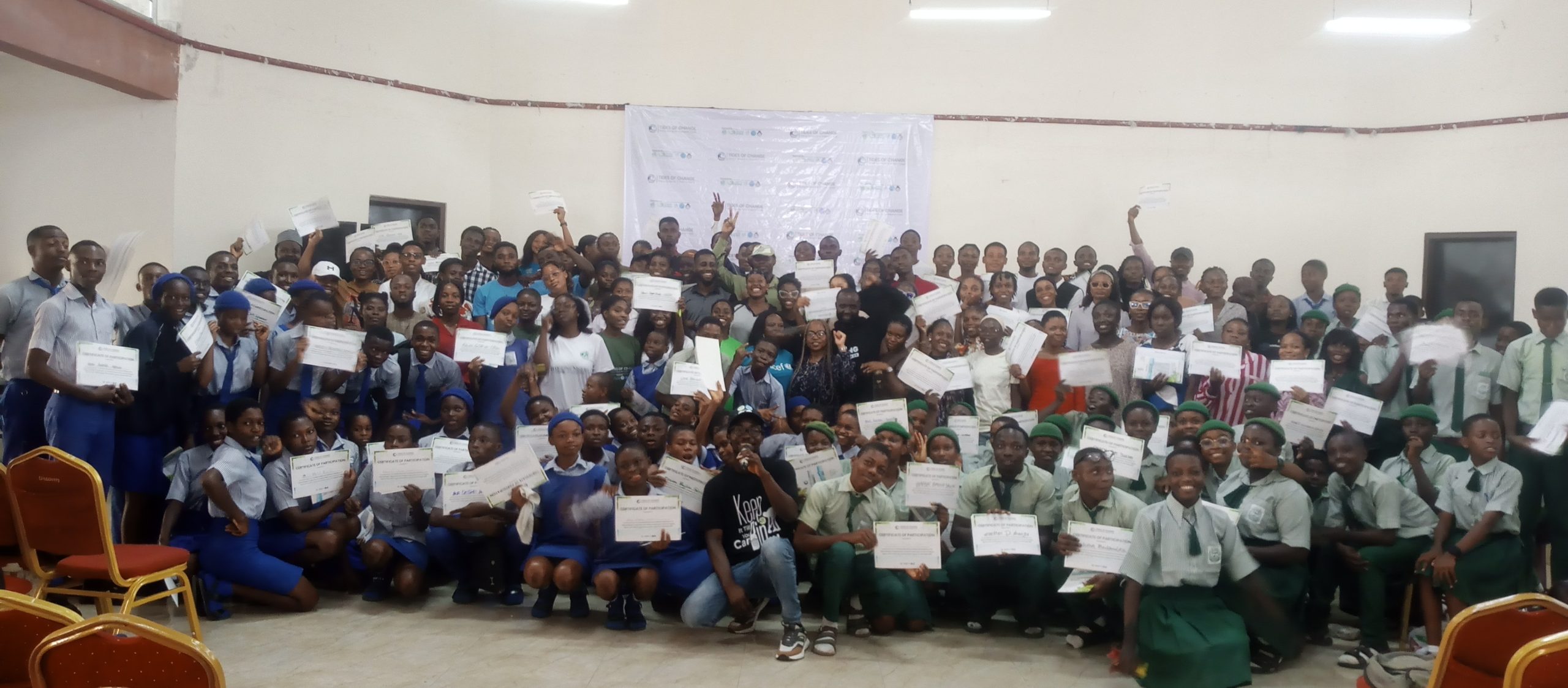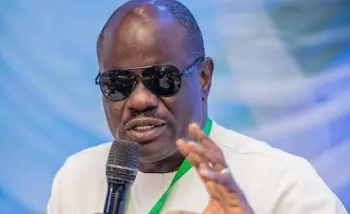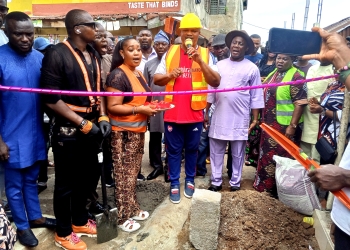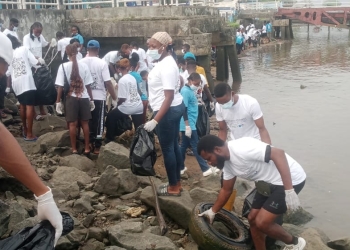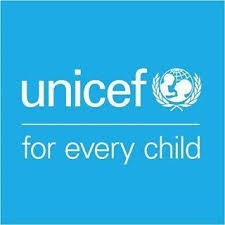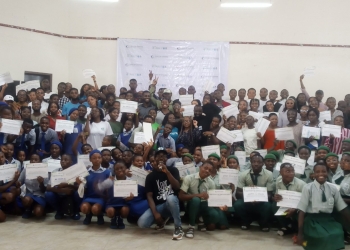A cross section of the students flashing their certificates at the Climate Education and Awareness Session Programme held at the University of Calabar on Thursday.
By Anietie Akpan
United Nations Children’s Fund (UNICEF), Plogging Nigeria and others have called for an urgent action to adopt sustainable lifestyles and reduce waste on the environment.
This the experts said, has to align with the United Nations Sustainable Development Goals (SDGs) 13 (Climate Action), 14 (Life Below Water), and 15 (Life on Land) so as to rescue the environment that is so much degraded through human activities.
It was an event that featured an engaging upcycling workshop, interactive breakout sessions among the student participants, the presentation of certifications, and a showcase of resolutions from discussions which one of the students, Blessing Joseph, of SS3 class in Margaret Ekpo Secondary School, Calabar, commended UNICEF for the programmme saying they have learnt so much on issues of environment.
She said, “we as the young generation we will help spread the message of sustainable environment to help reduce the dumping of wastes like plastics on the environment”.
Speaking at the launch of a three-day (April 3-5) UNICEF sponsored Climate Education and Awareness Session Programme for secondary school students and undergraduates at the University of Calabar with the theme; “Tides of Change, Young Voices for a Greener Coast”, the representative of UNICEF, a WASH Specialist from the Enugu Office, Mrs. Rebecca Bolatito-Gabriel, “UNICEF is committed to ensuring that the environment is kept safe and livable”.
Addressing the large number of students who came from Government Secondary School, Uwanse, Margaret Ekpo Secondary School and University of Calabar, she listed the the severe health risks children face due to pollution, which include “pneumonia, respiratory infections, asthma, and birth defects” and called for caution.
She commended the Cross River State Government and its Ministry of Environment for their commitment to sustainability initiatives like the Green Rising project, reiterating UNICEF’s dedication to ensuring a safe and livable environment.
The Executive Director of Plogging Nigeria, Mr. Muyiwa Iyamolere, in his presentation, stressed the need for one to become an Eco Champion by not dumping waste like plastics chanting the slogan, “keep it till you can bin it” as a catch word for the students and others.
He said human activities, including “indiscriminate plastic waste disposal, pollution, and deforestation, are accelerating climate change and leading to dire consequences such as rising sea levels, extreme temperatures, economic downturns, and droughts”.
According to him, the impact of deforestation, cautioning that unregulated tree cutting contributes to soil erosion, habitat destruction, and reduced oxygen production.
“We must adopt systematic tree-planting strategies before felling trees”, Iyamolere said adding that as part of the environmental call to action, people must “embrace the five Rs: Refuse, Reduce, Reuse, Recycle, and Recover” to ensure that the environment is protected.
He emphasized the need to protect the very environment that sustains all lives, suggesting that for every tree cut down, multiple trees should be planted to replenish lost greenery.
He said, “cutting down trees is not bad but we must cut rhem systematically…Plastics are dangerous to environment. Oldest plastic of over 200 years has not decared so must refuse the use of plastics”.
In a goodwill message, the Head of External Relations and Head of Employment Relations and Partnership, University of Calabar, Dr Blessing Ntamu, said, “we are glad to partner with UNICEF on this green rising event and it has created awareness on the environment and how to protect our environment and its natural resources”.
Her words : “UNICEF is our partner and we are collaborating with UNICEF doing this awareness. There is no doubt that as humans we have impacted negatively on the environment. Everybody can feel the heat. If you lived in Calabar 20 years ago, you will know that the amount of rainfall we used to have is not the same we are having now.The temperature of the environment has changed and all of these are due to our activities” .
She said, “there is a whole lot we can do to change all these. Materials like plastic waste are non degradeable and they stay in the environment for 100 of years and we need to reduce the use of these kind of materials, refuse to use them were we can, recycle .
“As I told the students, one or two things you can do is that when you go to the market, instead of picking a plastic bag for every item you buy, just get yourself a market basket and you can reuse them over and over again and you are helping to preserve them environment.
“Let’s stop deforestation. cutting down trees without planting more trees not good. We should take it as a point of duty to plant one tree a year . If all plant one tree a year, we would have done the environment so much good. We have to take action and decide not sitting on the sidelines , let us come together and serve the environment”.
Cross River State Commissioner for Environment, Hon. Michael Osogi said the state government is committed to a transitioning towards a green economy and sustainable environment.
The Commissioner who was represented by Mr. Sonigitu Asibong Ekpe, Director, Scientific in Charge of the Department of Ecology and Biodiversity Conservation said, the state government would soon launch an Environmental Policy on June 5, 2025, emphasizing the need to bridge the knowledge gap in environmental conservation.
He further revealed that the state has secured federal government backing for a 35 million Euro feasibility study on an eco-plan along the Lafarge evacuation corridor, to be funded on equity.
